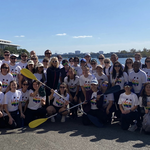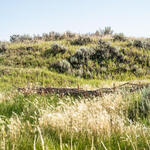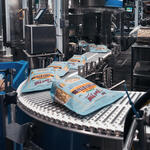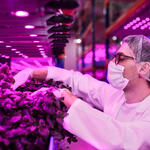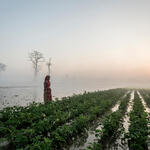- Date: 24 January 2023
The Markets Institute @ WWF identifies global issues, trends, and tools around the most pressing challenges of our time. Each year we publish what we think were the biggest surprises of the previous year and release a list of what may be key emerging developments that will affect the global food system and will be important for producers, consumers, the private sector, and governments to consider as they anticipate issues and trends and respond more effectively and at speed and scale.
The lists are identified through research, interviews, data analysis, gleanings from others, and especially through discussions with the Markets Institute’s Thought Leader Group. As always, we welcome feedback and discussion, so please get in touch. We hope you are staying safe and as healthy as you can in 2023.
— Jason Clay, Executive Director, Markets Institute @ WWF
- Date: 18 January 2023
- Author: Melissa D. Ho, Senior Vice President, Freshwater and Food
Last month, in December 2022 global sporting eyes were riveted by the World Cup final going into overtime, but on the very same day an even more critical global conversation went past its expected final whistle as well, leading to an outcome that may well score a win for people and nature and lead to a sustainable future for our planet.
The Kunming-Montreal Agreement, reached at the UN CBD COP15 Conference in Montreal in December, commits the world to halting and reversing biodiversity loss by 2030, as massive and important a goal as achieving the 1.5 degree target for addressing climate change.
- Date: 18 January 2023
WWF Launches Free Resource to Support Business
Nature and the economy are inextricably linked. We know we’re losing biodiversity at an unprecedented rate. We also know our economy relies on nature — more than 50% of global GDP, or approximately US$44 trillion, is moderately or highly dependent on nature and its services. This means biodiversity loss is creating systemic financial risks and can directly impact companies’ profitability and future resilience, ultimately affecting financial institutions’ investment performance, financing and underwriting activities.
- Date: 30 December 2022
- Author: Susan McCarthy and Lorin Hancock, WWF
Your editors of Sustainability Works are once again stepping out of the shadows to deliver a few words to close out 2022.
It’s a privilege to work at WWF and be surrounded by incredible people whose work is literally changing the world for the better (you can meet a few of them in our Behind the Scenes series). In fact, there is so much work going on that you would be forgiven for missing a few great stories, projects, or research results—sometimes we have trouble keeping up with it ourselves! And so we bring you our recap blog, highlighting some stories from the past year that we want to make sure you catch.
Scroll through the gallery to see just a few examples of how sustainability worked in 2022:
- Date: 21 December 2022
- Author: Sheila Bonini, Senior Vice President, Private Sector Engagement
As we wrap up 2022, I want to reflect on the conservation impact made during the year. The Year of the Tiger held tremendous significance, with the big cats’ numbers on the rise in some countries. Though, the Year of the Tiger also symbolizes resilience in the face of challenges, and from the 2022 Living Planet Report, we know we have a long way to go to combat climate change and biodiversity loss. Together with the corporate sector, we have the capabilities to help build a nature-positive society. And through your support this year, we’ve made unprecedented progress toward that goal.
- Date: 21 December 2022
- Author: Casey Bereszniewicz, AmeriCorps Intern
Widespread drought conditions continue to persist in much of the Northern Great Plains (NGP) according to University of Nebraska’s National Drought Mitigation Center. The NGP is experiencing increasing temperatures, changing precipitation patterns, and extreme events that are posing challenges to an already water-limited region. This region is also an integral part of the nation’s food supply, with vast tracts of land devoted to livestock grazing.
Humans and wildlife alike are forced to find ways to adapt to these increasingly common drought conditions. Through World Wildlife Fund’s (WWF) Ranch Systems and Viability Planning (RSVP) program, ranchers in Montana have access to an innovative cost-sharing program that can help ranchers adapt and become more resilient to drought conditions.
- Date: 20 December 2022
If you’re baking this holiday season, you’re likely doing the best you can to make the most of your ingredients and waste less. But it’s not just up to consumers to do their part; minimizing food waste must be a priority throughout the entire supply chain. And some companies are already rising to that challenge.
Bob’s Red Mill partnered with the Pacific Waste Food Waste Commitment, along with TripleWin Advisory, to develop an employee engagement campaign to reduce food waste in their whole grain milling and packaging facility in Milwaukie, Oregon. The details of the campaign and its results are available in a new case study here.
We caught up with Julia Person, Sustainability Manager at Bob’s Red Mill, to discuss lessons from the campaign and how and why the company is working to address food waste.
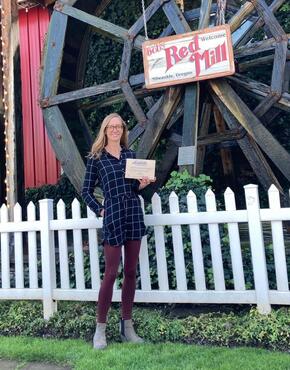
Julia Person, Sustainability Manager at Bob's Red Mill
Why is addressing food waste a priority for Bob’s Red Mill?
We’re proud to be the first manufacturer to sign onto the Pacific Coast Food Waste Commitment to collaboratively cut food waste in half by 2030, and we hope to lead the way for other companies in the Pacific Northwest. This issue is a priority for two different reasons: we know preventing food waste can help fight climate change and stop hunger, and it also makes our business more efficient and profitable. As an employee-owned company, our profits are shared with the entire team. That’s a powerful incentive for us all to work together to prevent food waste. But it’s also a natural outgrowth of our core values of Respect, Teamwork, Accountability and Determination.
- Date: 14 December 2022
- Author: Julia Kurnik, Director, Innovation Startups, WWF Markets Institute
Food production is the largest human impact on the planet. It contributes to habitat conversion, greenhouse gas (GHG) emissions, soil degradation, agrochemical run-off, and inefficient water use. World Wildlife Fund (WWF) envisions a more distributed and resilient food system in which some food is produced at scale closer to consumers, with more efficient use of inputs, less waste, and a lower carbon footprint. Soilless indoor farming could help get us closer, especially if paired with energy and site innovations, community integration, and knowledge sharing. To that end, WWF embarked on a project to better understand the challenges of this growing industry and develop practical solutions.
- Date: 08 December 2022
- Author: Melissa D. Ho, Senior Vice President, Freshwater and Food
Transforming our food systems is critical if the planet is to meet our ambitious and necessary goals for climate, nature, and people. How we produce and consume food will determine the future of humanity. Science clearly states that agricultural production contributes over a quarter of greenhouse gas emissions and is the major driver of biodiversity loss and the degradation of soil and water globally. We neglect these impacts at our own peril because food production for future generations depends on what we do now to ensure healthy ecosystems and a stable climate. While the dual crises of climate and biodiversity loss are inseparable, so too are the solutions and it is here where agriculture has a critical role to play.
- Date: 07 December 2022
The future of the plastic waste crisis will be determined by the actions the world takes today to address it. Some of the world’s largest brands—and users of single-use plastic—have gotten started, by setting time-bound commitments to reduce their plastic waste footprints. If met, many of these targets can help prevent upwards of 50M metric tons of plastic waste by 2030*.
It's crucial, for both people and the planet, that these companies succeed. WWF launched ReSource: Plastic in 2019 with the purpose of closing the “how” gap for success, equipping companies with the latest data and insights they need to take actions that maximize the potential for impact. Through an innovative measurement framework, ReSource helps companies translate their ambitious commitments into meaningful, measurable progress on plastic waste reduction.



